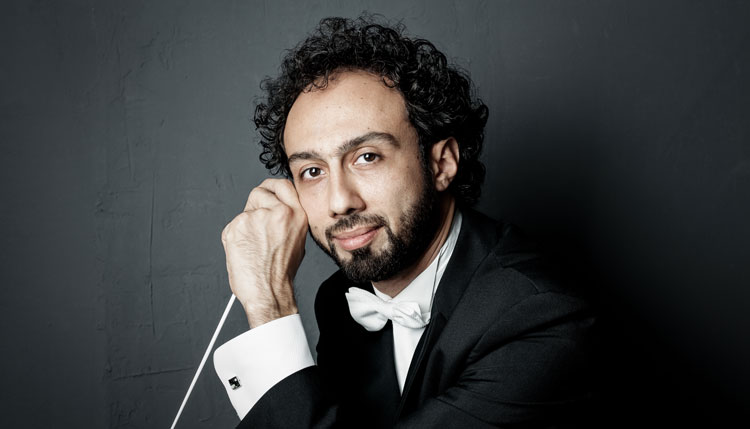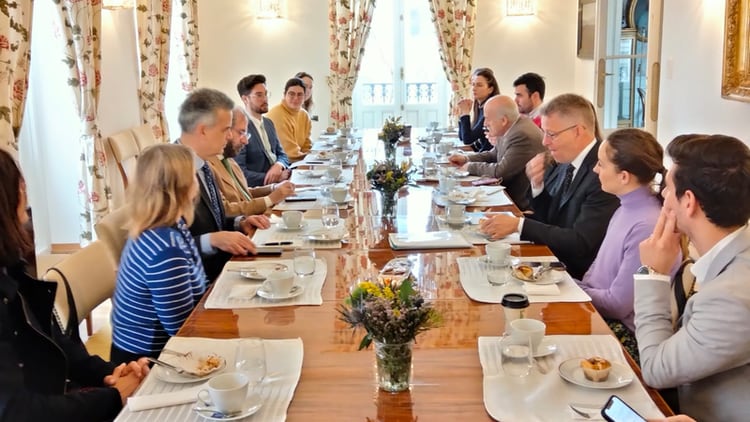Fuad Ibrahimov
Chief Conductor of the Azerbaijan State Symphony Orchestra
Juan David Latorre
On 4 March, the Auditorio Nacional de Música in Madrid was dressed up to welcome the Azerbaijani conductor Fuad Abrahimov, who performed symphonies by Beethoven and Mendelssohn with the Orfeón Donostiarra and the Orquesta Santa Cecilia.
Born in the Cultural Capital of Azerbaijan, the city of Shusha, in 1982, Fuad Abrahimov began his musical studies at the age of 12 and for the last 8 years has been the chief conductor of this orchestra, principal conductor of the New Munich Philharmonic Orchestra and the Baku Chamber Orchestra.
– You were a child prodigy, at the age of 15 you were accepted as violinist of the Azerbaijan State Symphony Orchestra. What is the life of a child and a teenager with such responsibility, and even more so in the country of a conductor like Mstislav Rostropovich?
– My mother also considers me a child prodigy, although I don’t think so. God gave me many gifts: to have a gift for people, to be attentive to details, to act in a premeditated way and, of course, to perceive musical styles correctly. You can imagine what responsibility I have to live with. And even more so if you were born in Shusha, the city where eminent personalities of music, poetry and world-famous artists were born…
– From a very young age, you have had to use diplomacy in your relations with important people from other countries and famous and acclaimed musicians. What is diplomacy for you? Do you think it is necessary in personal relations and between countries?
-Diplomacy has a special place in my life. It has been with me since childhood, and that makes me happy. The main thing is not to use it to the detriment of creativity, music; you have to achieve perfection and results in everything you work on. For a perfectionist (I mean myself) being a diplomatic person is also a plus.
– You were born in the city of Shusha, declared the Cultural Capital of Azerbaijan in 2021. What was it like growing up and practising music in your childhood in an environment of conflict due to the confrontation with Armenia?
– I had a happy childhood! I remember every moment of my childhood in Shusha. I can spend a lot of time on its detailed description. For example, my first violin was a gift from the famous Azerbaijani composer Suleiman Aleskerov (he is also from Shusha). With my grandfather (xanəndə – mugam vocalist) I used to go on tour in Karabakh. My family often went to the beautiful natural parks to relax. My favourite place was “İsa bulağı” (Fountain of Isá). But, unfortunately, this happiness did not last long. When I was 9 years old, we had to leave my favourite city, my Shushá. We became refugees, like almost a million Azerbaijanis from Karabakh. A year before the evacuation, I no longer had the possibility to go to school and play music. We were in the middle of the war, bombarded with missiles, shot at with tracer bullets. Every day we had to take shelter in the basement of our house and pray to stay alive.
– You have placed special emphasis on working with talented young musicians since you began your work as a conductor, and you have created the state “Young Philharmonic Azerbaijan”. What goals are being achieved with this creation?
– I continue to pay special attention to young musicians. Young musicians play in the orchestras I conduct – they are our future! I had many difficult periods in life, so I understand how important it is to help and support others. From this point of view, I would like to highlight the invaluable support provided by the Heydar Aliyev Foundation, which is reflected in the training at two higher education institutions in Germany. As a refugee, I could not even dream of studying in Germany. Many young people can share such experiences. Therefore, I consider it my duty to share all my knowledge and experience with the future generations of our country.
– Is it easy for an Eastern European to make his way in historical centres of classical music like Vienna or Germany?
– Yes, one can say that today it is possible. But to live up to that level, to interpret the music correctly and after the performance not to close doors behind you is not easy at all! Therefore, you should always study, develop yourself and not expect too much from luck.
– What are your musical preferences? Tell us a composer, a symphony, a piece of music.
– I love music in all its manifestations! It is said: “There is no bad music, there is bad interpretation”! It is very difficult for me to name a favourite composer or favourite piece of music – there are so many! I am enchanted by every composer and every piece of music I perform!







